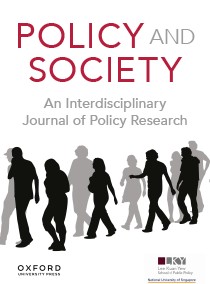参与方式:公民参与挪威卫生和规划部门
IF 6.1
1区 社会学
Q1 POLITICAL SCIENCE
引用次数: 0
摘要
本研究探讨了不同政策领域和参与形式的公民参与的不同模式和动态。它以挪威的情况为重点,着重于公民参与最明显的两个领域,即卫生部门和规划领域。基于深入的实证分析,它确定了三种不同的公众参与模式,这些模式在关键参与者、影响渠道、国家-社会关系、公民角色及其主张的规范地位方面有所不同。研究发现,传统的社团主义模式在卫生和规划领域仍然普遍存在,但在卫生领域存在同伴支持工作者模式,在城市规划领域存在公务员与市民之间片面的信息交换。它揭示了形成不同参与模式的潜在逻辑,并研究了每种模式下社会多样性和政策影响之间的先决条件和相互关系,从而解决了公民参与的两个最持久的缺点。实证分析利用了对公务员、利益相关者和研究人员的访谈,以及法律、政策指导方针和委员会报告等文件。它建立在参与式治理、政策制定和基于知识的政策制定的现有研究基础上,并以参与、代表和包容为重点,与民主理论相结合并加以完善。本文章由计算机程序翻译,如有差异,请以英文原文为准。
Modes of involvement: citizen participation in the Norwegian health and planning sector
This study explores the varying patterns and dynamics of citizen engagement across policy fields and participation formats. It zooms in on the Norwegian context and focuses on those two fields where citizen involvement is most pronounced, that is the health sector and the planning field. Based on in-depth empirical analysis, it identifies three distinct modes of public involvement that differ in terms of key actors, influence channels, state–society relations, citizens’ roles, and the normative status of their claims. The study finds that the traditional corporatist mode is still prevalent in both health and planning, but complemented by the peer support worker-mode in health, and one-sided information exchange between civil servants and citizens in urban planning. It uncovers the underlying logics shaping the different participation patterns and examines the preconditions and interrelations between social diversity and policy impact in each mode, thereby addressing two of the most persistent shortcomings of citizen engagement. The empirical analysis draws on interviews with civil servants, stakeholders, and researchers, as well as documents like laws, policy guidelines, and committee reports. It builds on existing research on participatory governance, policy development, and knowledge-based policy-making, and it engages with and refines democratic theory with a focus on participation, representation, and inclusion.
求助全文
通过发布文献求助,成功后即可免费获取论文全文。
去求助
来源期刊

Policy and Society
Multiple-
CiteScore
18.00
自引率
6.50%
发文量
43
审稿时长
30 weeks
期刊介绍:
Policy and Society is a prominent international open-access journal publishing peer-reviewed research on critical issues in policy theory and practice across local, national, and international levels. The journal seeks to comprehend the origin, functioning, and implications of policies within broader political, social, and economic contexts. It publishes themed issues regularly and, starting in 2023, will also feature non-themed individual submissions.
 求助内容:
求助内容: 应助结果提醒方式:
应助结果提醒方式:


